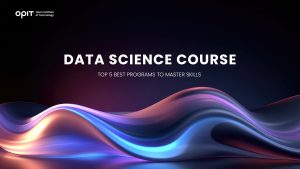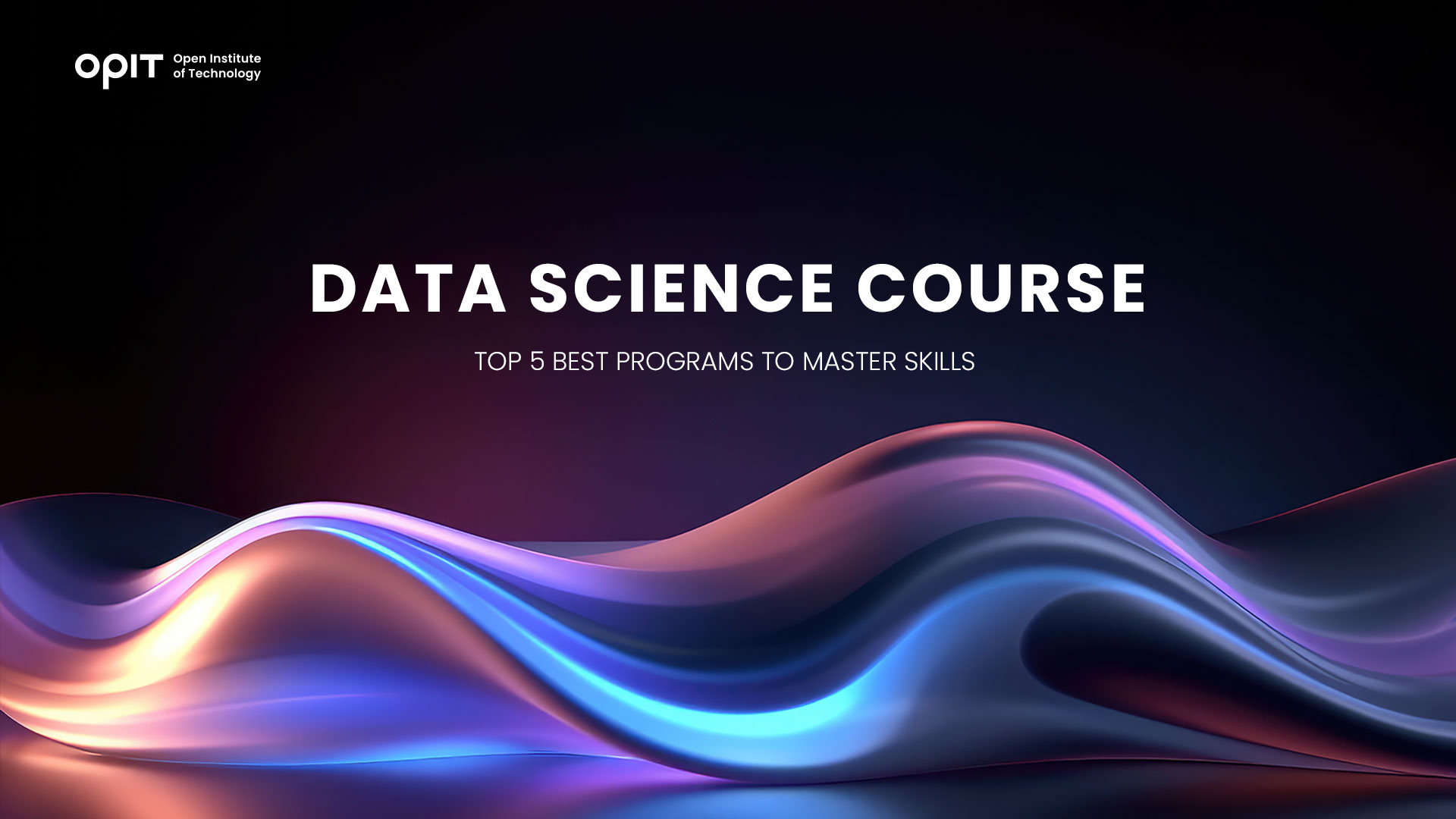Read the full article below (in Italian):


Data science is all the rage these days. It plays a pivotal role in many organizations, as it makes raw data easily understandable for managers and owners. In turn, it provides stakeholders with better decision-making opportunities.
Considering the enormous importance of data science, it’s no surprise the industry has grown to a whopping $65 billion. It’s also no wonder why there are 150K+ data scientists in the U.S., either, with more people expected to flock to this realm. So, why not become one of them and set yourself up to earn more than $120,000 per year?
All it takes is to invest in high-quality education, and this article will point you in the right direction. Here’s an overview of the five best data science courses to help propel your career.
Factors to Consider When Choosing a Data Science Course
We’ll take a closer look at the best data science courses in 2023 shortly, but let’s put that on hold for a few moments. After all, you don’t want to end up enrolling in a module that doesn’t suit your needs and budget, do you?
Our data science course buyer’s guide has come to the rescue. Check out the factors you should consider when selecting your module.
Course Content and Curriculum
Becoming a data scientist is a lucrative but broad career path. Did you know that this field branches out into multiple sub-fields? These include data engineering, machine learning, and data analysis. There’s no one-size-fits-all solution when it comes to data science courses, which is why you should make sure the curriculum ties in with your goals.
For example, if you want to spearhead the next generation of machine learning developments, look for a course that focuses on machine learning. In other words, module content should be in line with your needs.
Course Duration and Flexibility
Course duration is another important consideration. If you only want to scratch the surface of data science, a so-called boot camp might be a good choice. It typically lasts two or three months and gives you a basic understanding of this topic.
But if you wish to become a data science mastermind, a BSc or MSc in data science is the right option. It takes at least four years, but it teaches you all you need to know about this area, including theoretical knowledge and practical skills.
Instructor’s Expertise and Experience
Experienced instructors should also be a priority. Just like Elon Musk leads the way in Tesla with his extensive programming expertise, your teachers should be your focal point with their data science knowledge. Check their credentials before hitting the “Enroll” button.
Course Fees and Return on Investment
While you can get a lot of value out of a free data science course, paid alternatives are the real deal. Still, be sure you can afford the module before starting your first lesson. Reliable providers should offer transparent pricing with no hidden fees.
Course Reviews and Ratings
One of the best ways to determine if a course is compatible with you is word of mouth. So, put your search engine to work and see what others are saying about different modules. You’ll be able to learn more about the instructors’ approach, pricing, and content.
Best Data Science Courses Available
Now that you have a sense of direction when looking for a data science course, let’s get to the brass tacks of this article. Completing one of the following modules can be your leg up, giving you an edge over other candidates during your job search.
1. Data Science Specialization by Coursera
Coursera is the repository of many courses, including those related to data science. Their Data Science Specialization course can be an excellent choice if you have some understanding of this field but want to expand your horizons.
If you sign up for the module, you’ll gain access to an array of valuable lessons. The list includes cleaning and analyzing data with R, managing different projects with GitHub, and applying data regression models.
Furthermore, the instructors come from established institutions, and you get a shareable certificate after completing the course. Keep in mind that some prior Python knowledge is recommended to take the module.
Pros:
- Beginner-friendly
- Reliable instructors
- Shareable certificate
Cons:
- Requires Python knowledge
Price: Free enrollment from May 30; $49 per month otherwise
Duration: Approx. 11 months
2. The Data Science Course: Complete Data Science Bootcamp by Udemy
Although this is technically a boot camp, it’s one of the most comprehensive data science courses online. It lifts the veil of mystery surrounding data science and offers detailed explanations of the key concepts in this area.
For instance, if you wish to apply deep learning principles in your work, you can learn how to do so with this course. Other useful skills you can pick up here include Python-based machine learning, data pre-processing, logistic and linear regression, and statistical analyses.
The biggest downside is that lesson quality is inconsistent. Unlike Coursera, Udemy doesn’t attract renowned data science professionals. Basically, anyone can teach on the platform, even if they don’t have credentials. The good news is that you get a certificate of completion for passing the course.
Pros:
- Fairly detailed
- Wide range of skills
- Certificate of completion
Cons:
- Inconsistent teaching quality
Price: $74.99
Duration: 31 hours of video materials
3. Python for Data Science and Machine Learning Bootcamp by Udemy
Udemy makes another appearance on our rundown with their Python for Data Science and Machine Learning course. As you’ve probably guessed, it’s geared toward budding data scientists who want to climb the career ladder with Python.
And admittedly, the course does a good job of teaching the basics of this programming language. It tackles a variety of topics, such as machine learning, Pandas, Seaborn, Sci-Kit, decision tree algorithms, and natural language processing. It comes with a certificate of completion and is relatively short, allowing you to grasp the fundamentals of Python in just a few weeks.
Again, the only drawback might be lesson quality. You may receive instructions from first-class teachers, but you may also have subpar instructors.
Pros:
- Good representation of Python basics
- Natural language processing module
- Short and simple
Cons:
- Inconsistent instructions
Price: $74.99
Duration: 25 hours of video materials
4. Master of Applied Data Science by University of Michigan
For some aspiring data scientists, courses provided by renowned universities are the only ones in play. If you have the same affinity, consider this Master of Applied Data Science at the University of Michigan.
What stands out about this course is that it’s fully online, despite coming from a top-rated school. Therefore, you don’t have to attend classes in person to make headway.
When it comes to the curriculum, it covers most (if not all) subjects you need to apply data science in real life. It delves deep into machine learning, natural language processing, data preparation, and network analysis. Plus, you get a hands-on experience with real data from several companies around the globe. Completing the module earns you an accredited diploma.
As for the instructors, you shouldn’t have issues with inconsistent lectures. Michigan professors are well-versed in data science and know how to transfer knowledge effectively.
Still, many people are put off the program due to the price. It also requires some previous knowledge of statistics and Python.
Pros:
- Renowned institution
- Fully online
- Covers everything data science-related
- Great instructors
Cons:
- Pricey
- Previous knowledge required
Price: $34,000-$46,000
Duration: 12-36 weeks
5. Online Master of Computer Science by Arizona State University
The University of Michigan can be an excellent choice, but it doesn’t blow other schools out of the water. Arizona State is a solid option, too, with its Online Master of Computer Science.
Practical teaching is the highlight of this course. The curriculum focuses on applied projects throughout its duration, enabling you to gain a better understanding of data science and related fields. Some of the skills you can acquire and polish here include machine learning, software security, and computer forensics.
On top of that, the course puts a heavy emphasis on blockchain-related data science. Hence, if you want to test the waters with this ever-growing industry, Arizona State has you covered.
Instructions are also high-quality. Even though it’s an online course, the professors devote the same attention to you as to your fellow students on campus.
As for the drawbacks, the course isn’t affordable for many people. You also need to meet strict admission and GPA criteria.
Pros:
- In-depth course
- Blockchain analysis
- Top-rated professors
Cons:
- On the expensive side
- Stringent enrollment criteria
Price: $15,000
Duration: 18-36 weeks
Tips for Succeeding in a Data Science Course
Just because you choose an exceptional data science course doesn’t mean you’ll breeze through the curriculum. The following tips will help make your experience smoother.
- Set clear goals and expectations — Determine whether you want a basic or advanced understanding of data science.
- Dedicated time for learning and practice — Allocate as much time as necessary to learn and practice key skills.
- Engage in online forums and communities — Visit forums and other online communities to find heaps of resources and course materials.
- Work on real-world projects — Practice applying data science by manipulating real-life data.
- Continuously update your skills — Always look for new learning opportunities to get a full picture of your curriculum.
A Remunerative Career Is Waiting
If you’re looking to master critical skills, the best data science course for you might be Master of Applied Data Science by the University of Michigan. It’s expensive, but it’s jam-packed with real-world knowledge. If you need something simpler that still offers some value, the courses by Coursera and Udemy may be a good fit.
So, make your pick carefully. By enrolling in a course that aligns with your needs, you’ll get a better learning experience and higher retention. And nothing paves the way for a lucrative career in data science like top-grade education.
Related posts

Source:
- Agenda Digitale, published on June 16th, 2025
By Lokesh Vij, Professor of Cloud Computing Infrastructure, Cloud Development, Cloud Computing Automation and Ops and Cloud Data Stacks at OPIT – Open Institute of Technology
NIST identifies five key characteristics of cloud computing: on-demand self-service, network access, resource pooling, elasticity, and metered service. These pillars explain the success of the global cloud market of 912 billion in 2025
Read the full article below (in Italian):

You’ve probably seen two of the most recent popular social media trends. The first is creating and posting your personalized action figure version of yourself, complete with personalized accessories, from a yoga mat to your favorite musical instrument. There is also the Studio Ghibli trend, which creates an image of you in the style of a character from one of the animation studio’s popular films.
Both of these are possible thanks to OpenAI’s GPT-4o-powered image generator. But what are you risking when you upload a picture to generate this kind of content? More than you might imagine, according to Tom Vazdar, chair of cybersecurity at the Open Institute of Technology (OPIT), in a recent interview with Wired. Let’s take a closer look at the risks and how this issue ties into the issue of responsible artificial intelligence.
Uploading Your Image
To get a personalized image of yourself back from ChatGPT, you need to upload an actual photo, or potentially multiple images, and tell ChatGPT what you want. But in addition to using your image to generate content for you, OpenAI could also be using your willingly submitted image to help train its AI model. Vazdar, who is also CEO and AI & Cybersecurity Strategist at Riskoria and a board member for the Croatian AI Association, says that this kind of content is “a gold mine for training generative models,” but you have limited power over how that image is integrated into their training strategy.
Plus, you are uploading much more than just an image of yourself. Vazdar reminds us that we are handing over “an entire bundle of metadata.” This includes the EXIF data attached to the image, such as exactly when and where the photo was taken. And your photo may have more content in it than you imagine, with the background – including people, landmarks, and objects – also able to be tied to that time and place.
In addition to this, OpenAI also collects data about the device that you are using to engage with the platform, and, according to Vazdar, “There’s also behavioral data, such as what you typed, what kind of image you asked for, how you interacted with the interface and the frequency of those actions.”
After all that, OpenAI knows a lot about you, and soon, so could their AI model, because it is studying you.
How OpenAI Uses Your Data
OpenAI claims that they did not orchestrate these social media trends simply to get training data for their AI, and that’s almost certainly true. But they also aren’t denying that access to that freely uploaded data is a bonus. As Vazdar points out, “This trend, whether by design or a convenient opportunity, is providing the company with massive volumes of fresh, high-quality facial data from diverse age groups, ethnicities, and geographies.”
OpenAI isn’t the only company using your data to train its AI. Meta recently updated its privacy policy to allow the company to use your personal information on Meta-related services, such as Facebook, Instagram, and WhatsApp, to train its AI. While it is possible to opt-out, Meta isn’t advertising that fact or making it easy, which means that most users are sharing their data by default.
You can also control what happens with your data when using ChatGPT. Again, while not well publicized, you can use ChatGPT’s self-service tools to access, export, and delete your personal information, and opt out of having your content used to improve OpenAI’s model. Nevertheless, even if you choose these options, it is still worth it to strip data like location and time from images before uploading them and to consider the privacy of any images, including people and objects in the background, before sharing.
Are Data Protection Laws Keeping Up?
OpenAI and Meta need to provide these kinds of opt-outs due to data protection laws, such as GDPR in the EU and the UK. GDPR gives you the right to access or delete your data, and the use of biometric data requires your explicit consent. However, your photo only becomes biometric data when it is processed using a specific technical measure that allows for the unique identification of an individual.
But just because ChatGPT is not using this technology, doesn’t mean that ChatGPT can’t learn a lot about you from your images.
AI and Ethics Concerns
But you might wonder, “Isn’t it a good thing that AI is being trained using a diverse range of photos?” After all, there have been widespread reports in the past of AI struggling to recognize black faces because they have been trained mostly on white faces. Similarly, there have been reports of bias within AI due to the information it receives. Doesn’t sharing from a wide range of users help combat that? Yes, but there is so much more that could be done with that data without your knowledge or consent.
One of the biggest risks is that the data can be manipulated for marketing purposes, not just to get you to buy products, but also potentially to manipulate behavior. Take, for instance, the Cambridge Analytica scandal, which saw AI used to manipulate voters and the proliferation of deepfakes sharing false news.
Vazdar believes that AI should be used to promote human freedom and autonomy, not threaten it. It should be something that benefits humanity in the broadest possible sense, and not just those with the power to develop and profit from AI.
Responsible Artificial Intelligence
OPIT’s Master’s in Responsible AI combines technical expertise with a focus on the ethical implications of AI, diving into questions such as this one. Focusing on real-world applications, the course considers sustainable AI, environmental impact, ethical considerations, and social responsibility.
Completed over three or four 13-week terms, it starts with a foundation in technical artificial intelligence and then moves on to advanced AI applications. Students finish with a Capstone project, which sees them apply what they have learned to real-world problems.
Have questions?
Visit our FAQ page or get in touch with us!
Write us at +39 335 576 0263
Get in touch at hello@opit.com
Talk to one of our Study Advisors
We are international
We can speak in:


